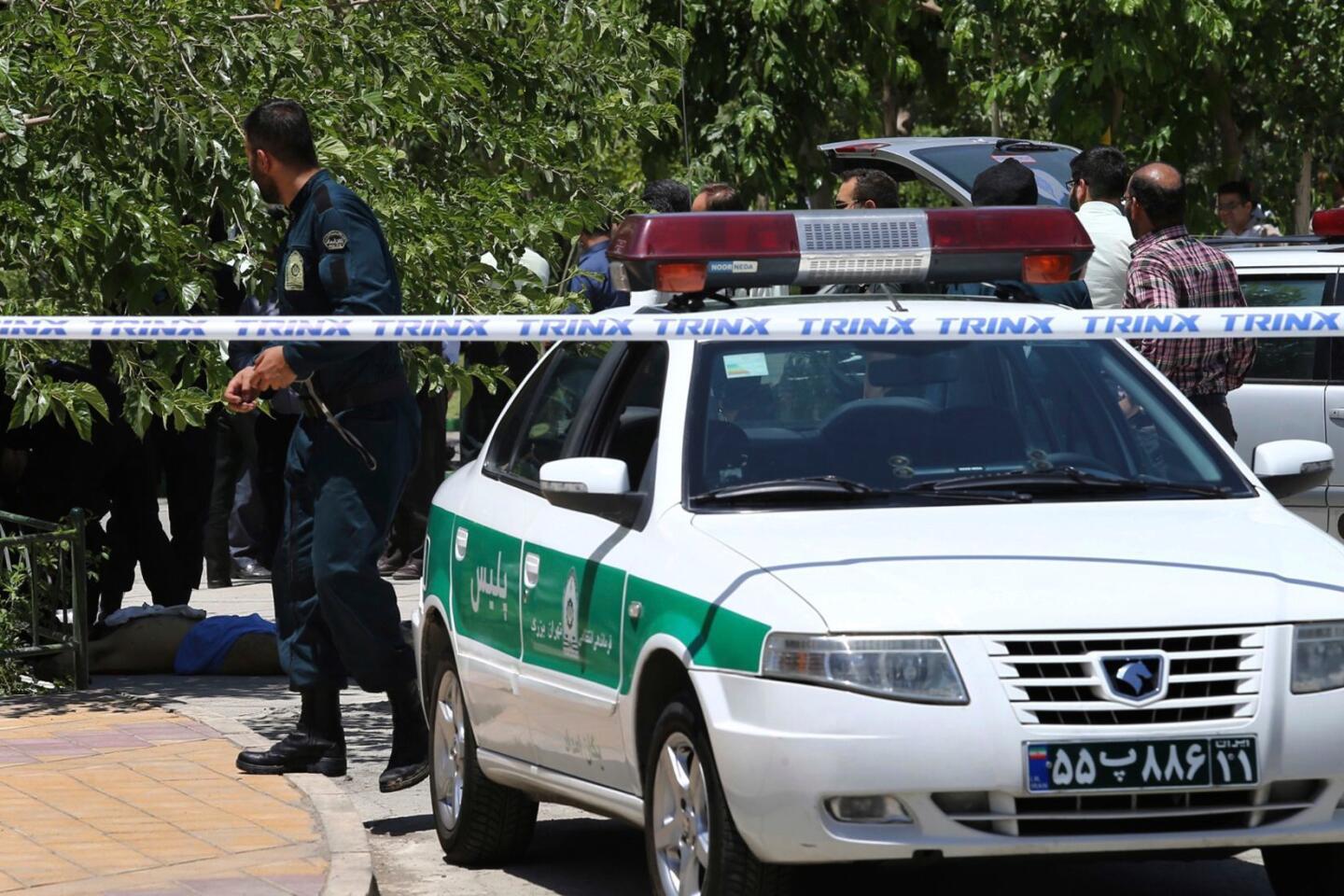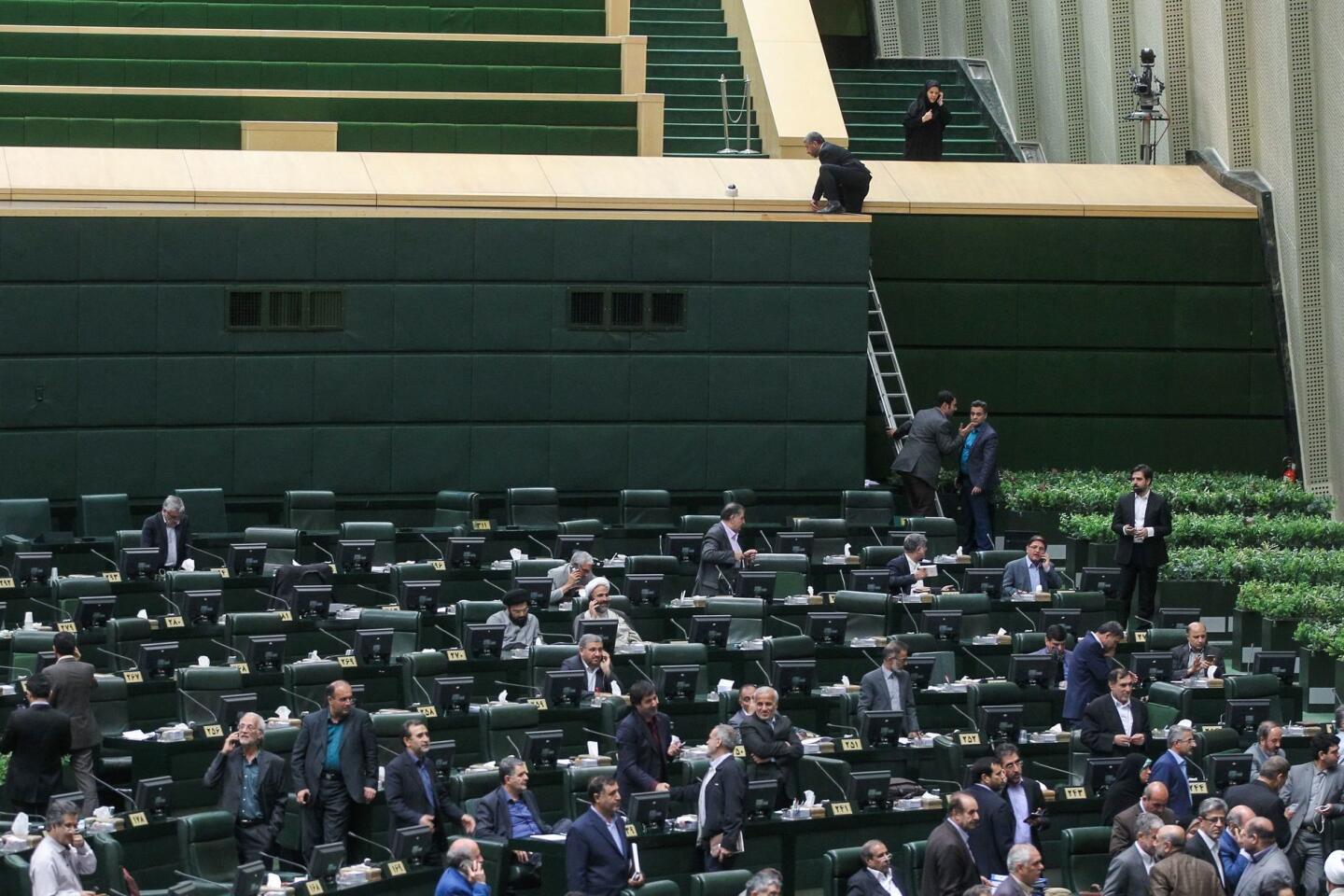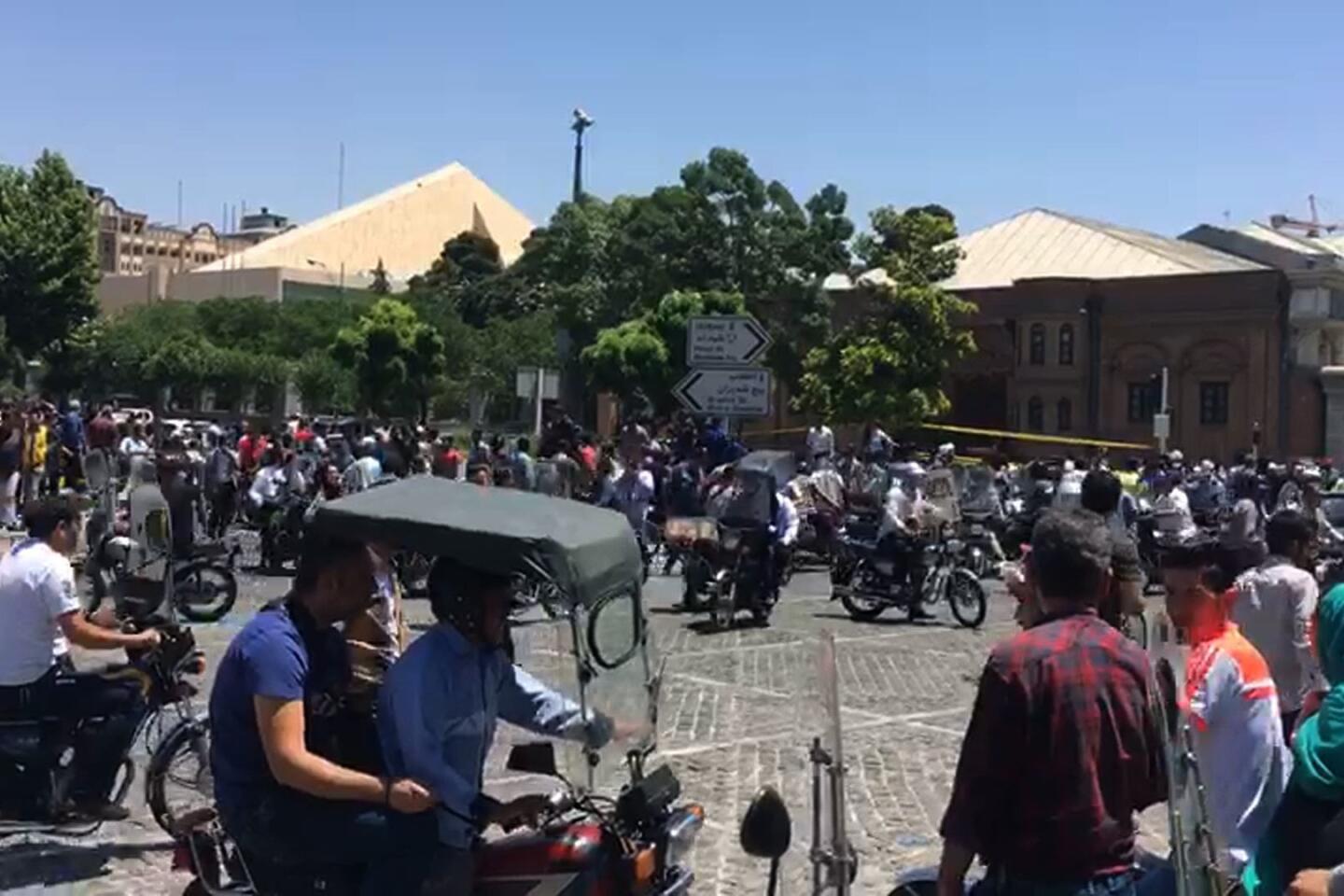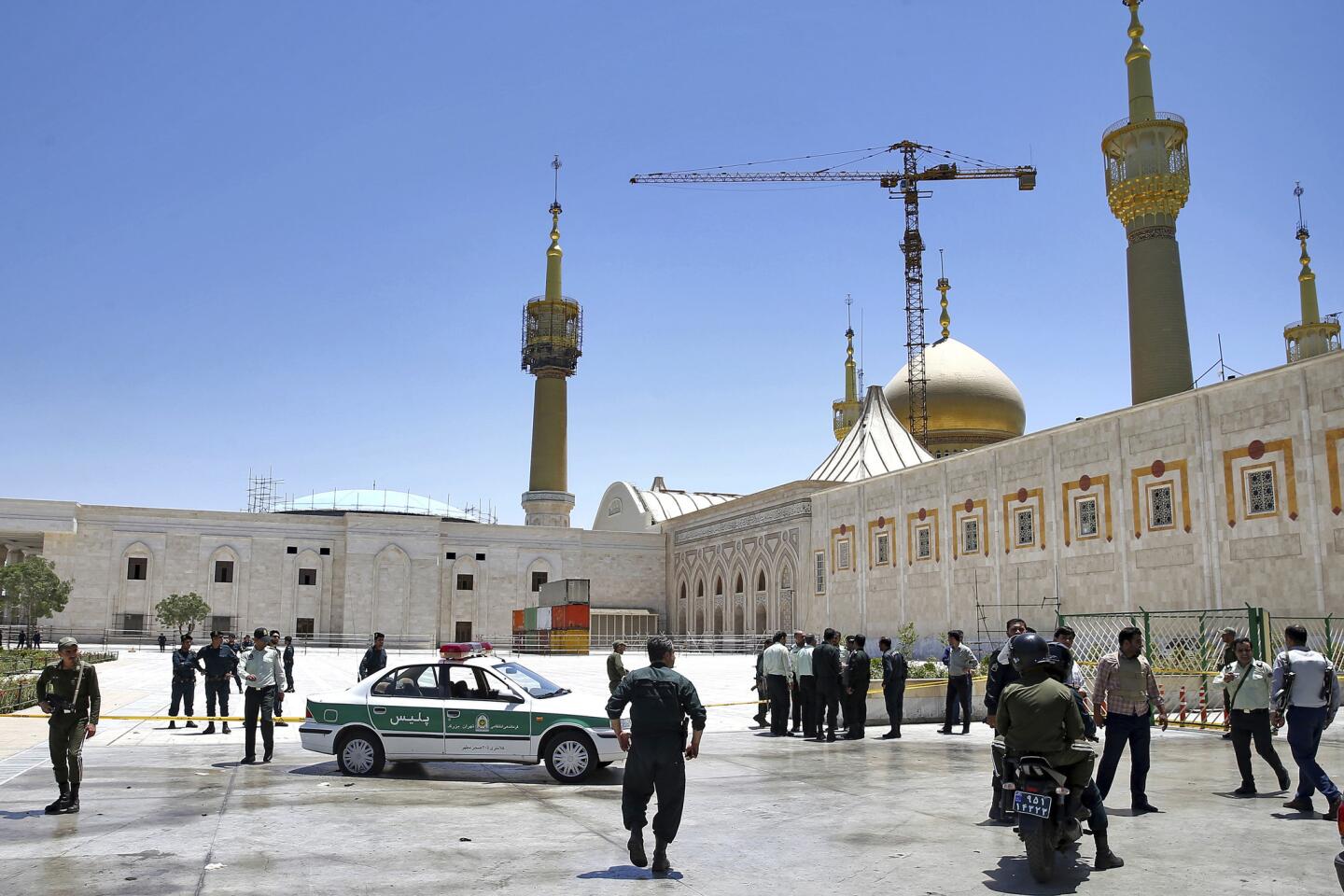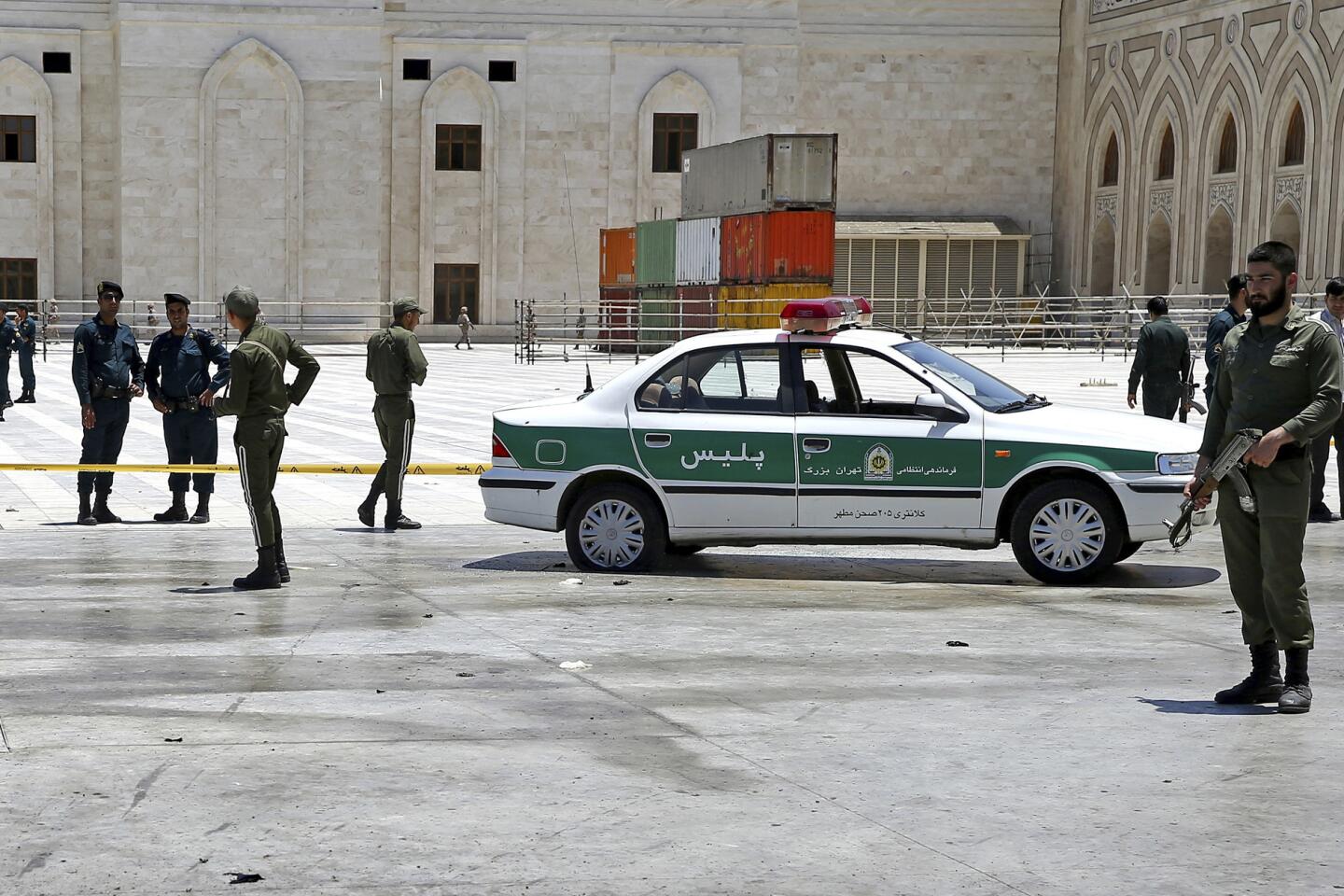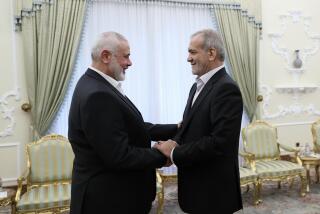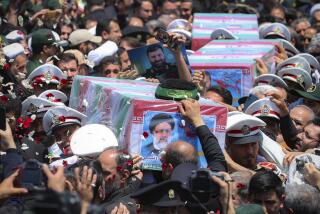Police make arrests, increase patrols as death toll climbs in Tehran attack
- Share via
Reporting from TEHRAN — Police increased patrols in the streets and subway stations of Tehran on Thursday, a day after a pair of Islamic State attacks on the parliament and the tomb of Iran’s revolutionary leader.
Iran’s Intelligence Ministry confirmed that at least five of the eight male attackers had fought for Islamic State.
Officials also announced that the death toll had increased to 17, not including the attackers. An additional 43 people were wounded in the attacks.
Many of the injured remained in intensive care at Cina Hospital in the capital on Thursday. Several lawmakers visited the injured, including Allaeddin Boroujerdi, who heads parliament’s national security and foreign policy commission.
Among those shot in the attack and still hospitalized Thursday was a former presidential bodyguard.
Ali Akbar, 34, had survived other attacks that killed fellow bodyguards while traveling overseas with then-President Mahmoud Ahmadinejad, according to a relative who requested anonymity because he was not authorized to speak to the media. The attack on parliament left Akbar with shrapnel in his neck and a bullet lodged in his abdomen, his relative said.
I could not resist fighting the terrorists, who were killing common people and staff in the light of day.
— Ali Akbar, a former presidential bodyguard
Akbar was heading home Wednesday and had stopped at a bank to guarantee a loan for a friend when he heard the attack at parliament and rushed over to help.
“He heard the shooting, went to the west gate of parliament, showed his card and was given a gun,” the relative said Akbar later told him. “He went to the third floor where the hostage takers had dozens of hostages and he started shooting at one of the terrorists, who was a tall, broad-shouldered [man] dressed in black, and gunned him down. But the other one killed several hostages: women, staff of the parliamentary offices.”
The attackers appeared to be Arab, Algerian and Tunisian, not Iranian, according to the relative.
The relative said that Akbar “told me in the ICU, ‘I could not resist fighting the terrorists, who were killing common people and staff in the light of day.’”
All of the attackers were killed: Four at parliament and four at the tomb of Ayatollah Ruhollah Khomeini, officials said. One of them was identified as Saryas Sadeghi, an Islamic State recruiter on the western border known to authorities for the last three years, according to state-run Fars news agency.
Funerals for victims of the attacks are expected to be held Friday. A procession is scheduled to start at 10 a.m. in parliament for guards killed there, with parliament Speaker Ali Larijani addressing the crowd, according to the official Islamic Republic News Agency
The rest of the funerals are expected to be held later in the day, during Friday prayers, when coffins wrapped in Iranian flags will be taken to the public cemetery in south Tehran, where they will be buried near defenders of a shrine that was attacked, local media reported.
The deputy interior minister, Mohammad Hossein Zolfaghari, told state TV that “law enforcement activities may increase” in the aftermath of the attacks.
He said authorities are focused on intelligence gathering.
Police said half a dozen suspects were held in connection with the attacks. Reza Seifollahi, a member of the Supreme National Security Council, was quoted by Iranian media as saying the attackers were Iranian nationals. At least one witness reported hearing an attacker speakPersian, but video posted online that appears to have been recorded by the attackers shows them speaking Arabic.
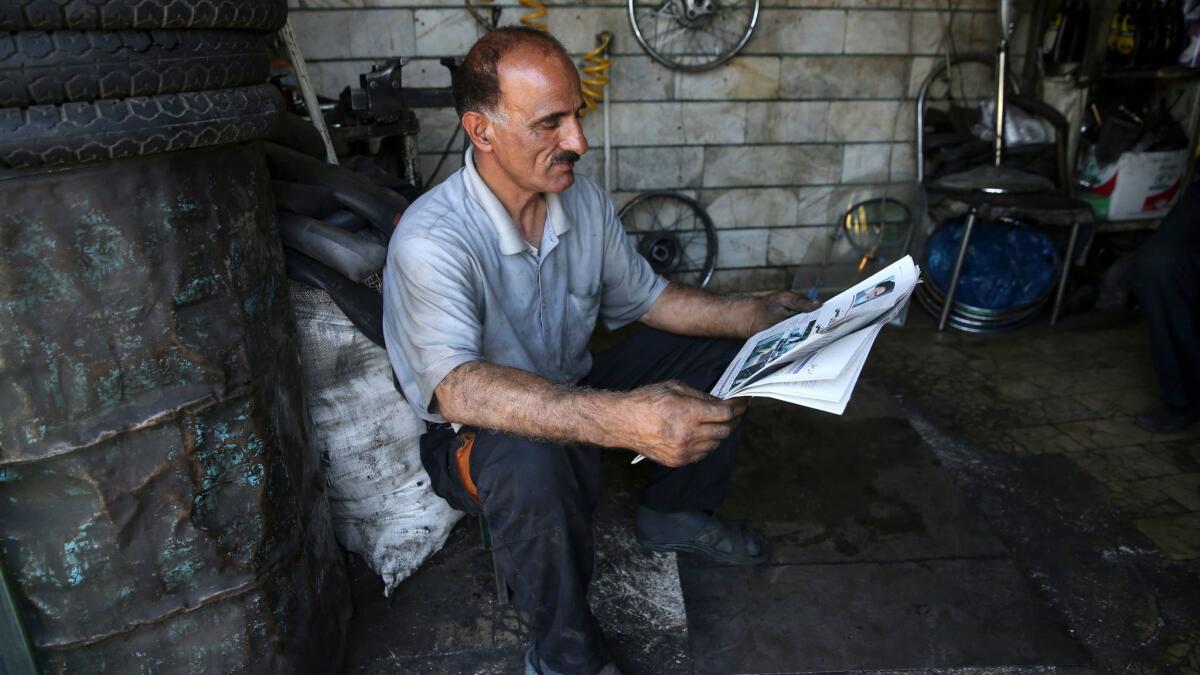
The assailants, armed with Kalashnikov rifles and explosives, attacked the parliament complex while lawmakers were at work, according to witnesses. The siege lasted several hours. Sixteen people were killed, and one of the attackers blew himself up inside the complex, according to state television.
At the same time, gunmen and suicide bombers attacked Khomeini’s mausoleum on Tehran’s south side, killing a security guard, according to state television.
Islamic State’s media arm quickly claimed responsibility for both attacks, the first in recent memory by the militants in Iran. Iranian forces are fighting the Sunni Muslim extremists in Iraq and Syria, and lawmakers have argued they’re doing so to prevent terrorist attacks at home.
The attacks also came at a tense time in the Middle East: Sunni Arab states, led by Saudi Arabia and backed by the U.S., have aligned against Iran’s Shiite Muslim leaders.
President Trump’s statement condemning the attacks also suggested that Iran had it coming. The United States considers Iran to be a state sponsor of terrorism.
“We grieve and pray for the innocent victims of the terrorist attacks in Iran, and for the Iranian people, who are going through such challenging times,” the statement said. “We underscore that states that sponsor terrorism risk falling victim to the evil they promote.”
Iranians angered by the statement took to social media to vent, recalling sympathetic vigils held in Tehran after the Sept. 11 terrorist attacks. Iranian Foreign Minister Mohammad Javad Zarif tweeted that Trump’s statement was “repugnant.”
“Iranian people reject such U.S. claims of friendship,” Zarif tweeted.
Iran’s Islamic Revolutionary Guard indirectly blamed Saudi Arabia for the attacks in a statement issued late Wednesday that also noted the “spilled blood of the innocent will not remain unavenged.”
Others also blamed the kingdom.
Khoda Karam Gomaraj was at Cina Hospital awaiting news about a friend injured in the attack.
“The terrorists were on the payroll of Saudi Arabia,” he insisted.
ALSO
After Iranians’ vote for reform, a bigger question looms: Who will be the next supreme leader?
More than 100 Muslim leaders refuse to perform funeral prayers for London attackers
Special correspondent Mostaghim reported from Tehran and Times staff writer Hennessy-Fiske from Beirut.
UPDATES:
1:40 p.m.: This article has been updated with funerals scheduled, other details.
This article was originally published at 7 a.m.
More to Read
Sign up for Essential California
The most important California stories and recommendations in your inbox every morning.
You may occasionally receive promotional content from the Los Angeles Times.
